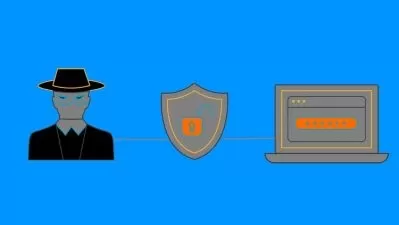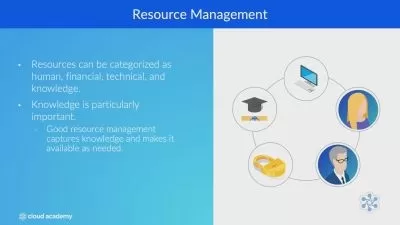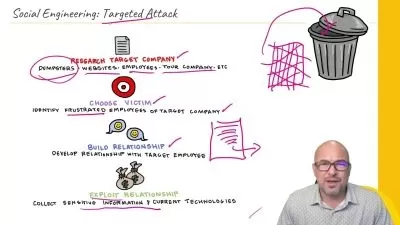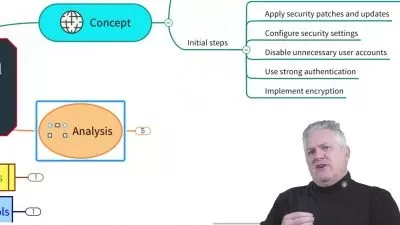Cybersecurity Foundations: From Zero to Pro - Bootcamp
Hailie Shaw
11:17:46
Description
Green to Green FREE Cybersecurity Bootcamp - Reach out on Discord
What You'll Learn?
- Understand the fundamentals of how computers function, including numbers, bits, hardware, and memory.
- Gain knowledge of operating systems, including a high-level overview, the boot-up process, and the differences between Windows and Linux.
- Develop an understanding of networking concepts, including network organization, devices, IP addresses, and protocols.
- Learn about the Windows and Unix operating systems, including users, logging, processes, file systems, and commands.
- Acquire knowledge of network security concepts, including router and switch configurations, terminology, and subnetting.
- Develop skills in analyzing network traffic through PCAP files, including header analysis, Wireshark usage, and identifying attacks.
- Understand the basics of vulnerability assessment and management, including the methodology and terminology used by blue teams.
- Gain an appreciation of encryption and public key infrastructure (PKI), as well as the security measures required to ensure network security.
Who is this for?
What You Need to Know?
More details
DescriptionAs cyber threats continue to increase in frequency and complexity, the demand for skilled cybersecurity professionals has never been higher. With the rapid digitization of businesses and organizations, there is a growing need for experts who can identify and mitigate cyber risks to safeguard sensitive data and intellectual property. Transitioning into cybersecurity can be a smart career move for individuals seeking job security, competitive salaries, and opportunities for growth and advancement. Additionally, the field offers a range of roles and specializations, including cybersecurity analyst, network security engineer, ethical hacker, and security architect, among others, providing learners with a variety of career paths to choose from.
The Cybersecurity Foundations Bootcamp is an intensive course designed to provide learners with a comprehensive understanding of cybersecurity concepts.
This course covers the fundamentals of how computers function, including numbers, bits, hardware, and memory.
Learners will gain knowledge of operating systems, including a high-level overview, the boot-up process, and the differences between Windows and Linux.
The course will also cover networking concepts, including network organization, devices, IP addresses, and protocols, as well as router and switch configurations, subnetting, and security.
In addition, learners will develop skills in analyzing network traffic through PCAP files, including header analysis, Wireshark usage, and identifying attacks.
The course will delve into the Windows and Unix operating systems, including users, logging, processes, file systems, and commands, as well as the basics of vulnerability assessment and management.
Finally, learners will gain an appreciation of encryption and public key infrastructure (PKI), as well as the security measures required to ensure network security.
Upon completion of this course, learners will have the knowledge and skills required to pursue a career in cybersecurity or to enhance their existing IT expertise in the field.
Who this course is for:
- Individuals who are interested in pursuing a career in cybersecurity.
- IT professionals who want to expand their knowledge in cybersecurity and improve their skills in the field.
- Anyone who wants to learn more about cybersecurity and is willing to invest time and effort into a comprehensive program.
As cyber threats continue to increase in frequency and complexity, the demand for skilled cybersecurity professionals has never been higher. With the rapid digitization of businesses and organizations, there is a growing need for experts who can identify and mitigate cyber risks to safeguard sensitive data and intellectual property. Transitioning into cybersecurity can be a smart career move for individuals seeking job security, competitive salaries, and opportunities for growth and advancement. Additionally, the field offers a range of roles and specializations, including cybersecurity analyst, network security engineer, ethical hacker, and security architect, among others, providing learners with a variety of career paths to choose from.
The Cybersecurity Foundations Bootcamp is an intensive course designed to provide learners with a comprehensive understanding of cybersecurity concepts.
This course covers the fundamentals of how computers function, including numbers, bits, hardware, and memory.
Learners will gain knowledge of operating systems, including a high-level overview, the boot-up process, and the differences between Windows and Linux.
The course will also cover networking concepts, including network organization, devices, IP addresses, and protocols, as well as router and switch configurations, subnetting, and security.
In addition, learners will develop skills in analyzing network traffic through PCAP files, including header analysis, Wireshark usage, and identifying attacks.
The course will delve into the Windows and Unix operating systems, including users, logging, processes, file systems, and commands, as well as the basics of vulnerability assessment and management.
Finally, learners will gain an appreciation of encryption and public key infrastructure (PKI), as well as the security measures required to ensure network security.
Upon completion of this course, learners will have the knowledge and skills required to pursue a career in cybersecurity or to enhance their existing IT expertise in the field.
Who this course is for:
- Individuals who are interested in pursuing a career in cybersecurity.
- IT professionals who want to expand their knowledge in cybersecurity and improve their skills in the field.
- Anyone who wants to learn more about cybersecurity and is willing to invest time and effort into a comprehensive program.
User Reviews
Rating
Hailie Shaw
Instructor's Courses
Udemy
View courses Udemy- language english
- Training sessions 31
- duration 11:17:46
- Release Date 2023/06/11















